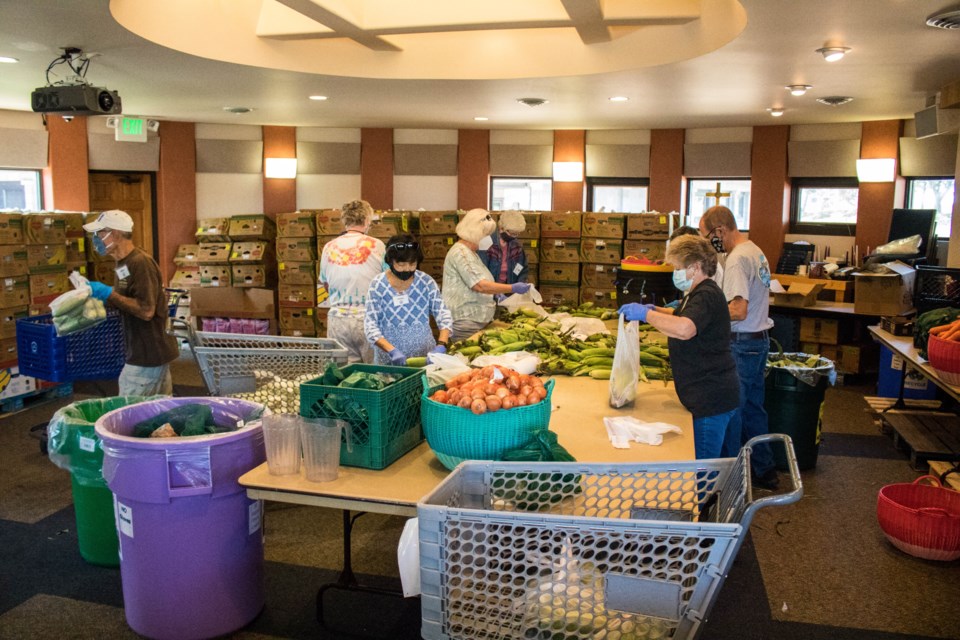Lea esta historia en español aquí
The 6-month-old COVID-19 pandemic has steamrolled Longmont’s more vulnerable residents and the agencies set up to throw them a safety net.
As many as 540,000 Coloradans lost their jobs after stay-at-home orders were issued in March, swelling ranks of the unemployed and putting them at the doorsteps of food banks and homeless shelters.
COVID-19 is hitting nonprofits especially hard.
A study by Candid estimates the pandemic could shutter thousands of nonprofits across the country. And as many as 1.6 million nonprofit workers were projected to lose their jobs between March and May this year, according to the Johns Hopkins Center for Civil Society Studies.
Feeding the hungry
Area food banks say they have distributed unprecedented levels of food to feed families, individuals and schools bludgeoned by the virus, stretching their own resources and forcing changes to keep up with the dangers posed by the pandemic.
“It’s put a strain on every element of our organization and it all came practically overnight,” said Julia McGee, spokeswoman for Community Food Share, which provides food to over 40 nonprofit groups in Boulder and Broomfield counties. Longmont’s OUR Center and The Inn Between are among Community Food Share’s partner agencies.
Last year, Community Food Share provided enough food for 5.6 million meals. Since the pandemic began in March, the agency has purchased three and half times more food than it did during the same time in 2019, according to the agency’s website.
Over 1.2 million pounds of food was distributed in April alone, an all-time record in the 39-year-history of Community Food Share, McGee said. Boulder Valley School District got 454,000 pounds of fresh produce for the district’s emergency food distribution.
At least a dozen more agencies are getting help from Community Food Share as the demand for food is not likely to wane anytime soon.
“This is our reality for the long haul,” McGee said. “... We anticipate the recovery period lasting much longer than the virus itself.”
The agency usually depends on an army of volunteers to package and deliver food. But volunteer ranks have shrunk because many are older and are staying at home to avoid contracting the virus, McGee said.
“We rely on volunteers because they supply about 40% of our labor,” she said. “Overnight, we lost 65% of our volunteers supporting us.”
To compensate, Community Food Share streamlined its operations including turning its onsite pantry into a diver-thru model, McGee said.
“We have learned to adjust to make sure we are there for the community,” she said.
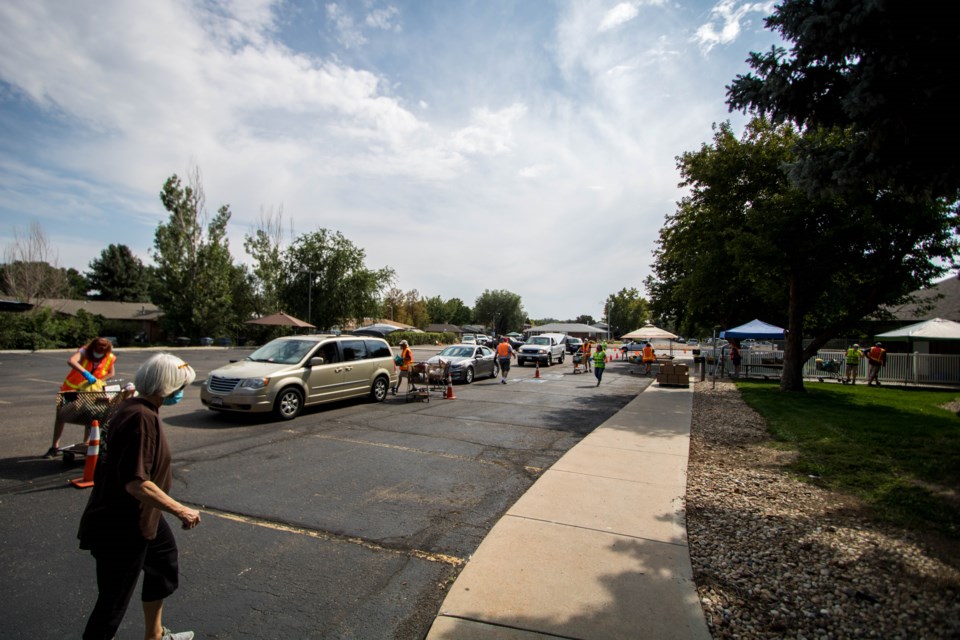 A line of cars waits at the Westview Presbyterian Church Round Pantry food distribution on Tuesday, Sept. 22, 2020. (Photo by Matt Maenpaa)
A line of cars waits at the Westview Presbyterian Church Round Pantry food distribution on Tuesday, Sept. 22, 2020. (Photo by Matt Maenpaa)Westview Presbyterian Church in Longmont, a partner agency of Community Food Share, served 375 families last week during its Tuesday distribution, the highest ever for that day in the 10-year-history of the church’s Round Pantry program, church officials said.
On Wednesday and Thursday, the Westview Round Pantry program delivered more than 400 individual food parcels to essential workers, at-risk neighbors, group living centers and other other individuals unable to get to the pantry distribution that takes twice a month, according to the church.
Meeting basic needs
Many people were suddenly left without resources or ways to find help if they lost their livelihoods or homes after the pandemic was declared on March 25, said Joseph Zanovich, executive director of HOPE, which provides food and shelter for Longmont’s homeless.
“From the shutdown period, it was so difficult to get basic needs met for people. No library, no gyms/rec centers, no restaurants, limited internet access, showers and restrooms,” Zanovitch said in an email. “We are expanding services as quickly as we can.”
Since April, HOPE has averaged giving out 400 sack lunches a month to those coming to the agency’s main office in Longmont for meals. That compares to an average of 150 sack lunches for January, Zanovitch said.
HOPE served 700 people last year and this year the agency will likely tend to the needs of at least 1,000, Zanovitch said.
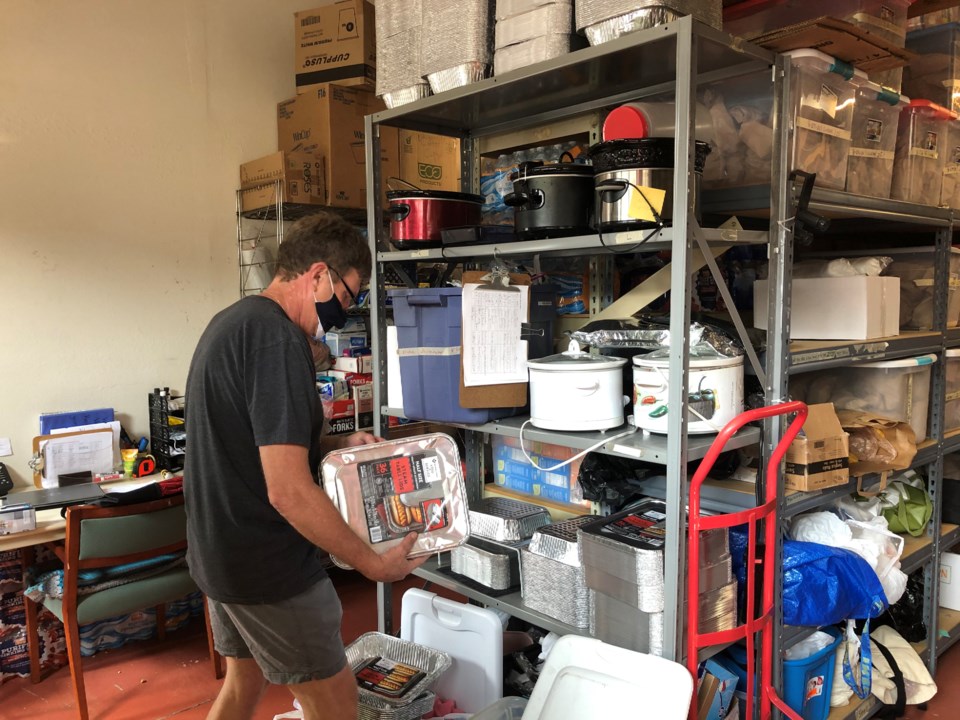 Volunteer Chris readies meal supplies for volunteers who wish to cook food for HOPE clients. (Photo by Macie May)
Volunteer Chris readies meal supplies for volunteers who wish to cook food for HOPE clients. (Photo by Macie May)HOPE’s effort to expand its services during the pandemic includes the addition of a day shelter, which provides food and showers, internet access and services, such as tax preparation assistance. In June, HOPE launched its SafeLot program that allows those living in their cars to park overnight and receive meals and have access to showers, as well as community. There are eight parking spaces available in the SafeLot.
HOPE's other programs include overnight shelter for the homeless in partnership with local churches, navigation services through the Boulder County Coordinated Entry Program, a bicycle distribution program and a warehouse where people — homeless or not — can pick up essentials such as clothing and toiletries.
HOPE has been helped out by donors to keep services rolling during the pandemic, Zanovitch said.
“We’ve been able to raise enough funds to keep our day shelter open until the end of the year and we continue to see an outpouring of support in physical donations to help support our clients,” Zanovitch said. “Our biggest immediate need is a new space for operations. We have outgrown our current space and we are in need of a larger facility to help us meet the demand of our services.”
‘Housing is health care’
On Sept. 18, Gov. Jared Polis toured apartments operated by The Inn Between of Longmont, which received $25,000 from the state’s COVID Rapid Relief Fund established to help nonprofits aid low-income families.
At the The Inn Between — which provides transitional and permanent housing for low-income and disabled adults and their families — the fund provided $16,100 in rent and utilities subsidies to 19 unduplicated households, said Tim Rakow, the agency’s executive director.
The fund also paid for increased cleaning efforts for six Inn Between facilities and $8,000 will go for a part-time teacher to offer one-on-one tutoring to children in kindergarten through eighth grades, Rakow said.
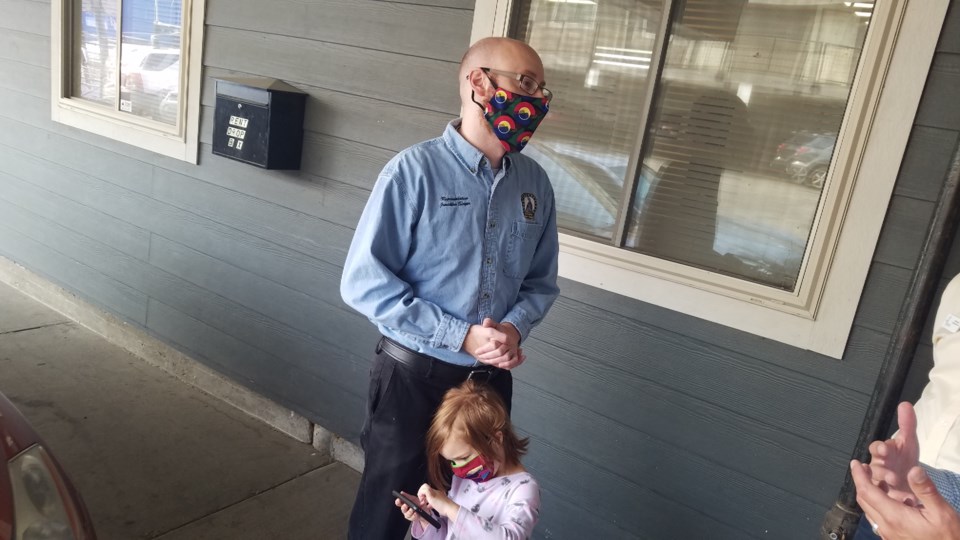 State Rep. Jonathan Singer and his daughter, Gwendolyn, during a Sept. 18 tour with Gov. Jared Polis at an Inn Between housing site. (Photo by Monte Whaley)
State Rep. Jonathan Singer and his daughter, Gwendolyn, during a Sept. 18 tour with Gov. Jared Polis at an Inn Between housing site. (Photo by Monte Whaley)During his visit, Polis said stabilizing homes in the era of COVID-19 is essential for families already facing economic problems. “This is one way to help families get a more solid footing, especially now, ” Polis said.
At least 72% of income-earning households in The Inn Between’s 88 units have members that either partially or totally lost their income during the first six months of COVID-19, Rakow said. All the households have fathers, mothers, brothers or sisters who were employed in service industry jobs — food service, cleaning, retail, bus drivers, preschool and child care, construction and nursing care, Rakow said.
Few qualify for unemployment benefits because of unstable employment history or they just recently re-entered the workforce, he said.
“If unemployment occurs, they are unable to pay rent and other (factors) are derailing their efforts to achieve long-term housing stability,” Rakow said in a statement.
Applicants, who are mostly homeless, must indicate financial need and also a willingness to work and acquire job skills to get stable employment to allow them more permanent housing, say Inn Between officials.
State Rep. Jonathan Singer accompanied Polis on his visit this month and quizzed Inn Between officials on what they needed to help low-income housing efforts. Singer told the officials funding will be especially tight this year due to COVID-19.
“But we have to do something for people who need housing,” Singer said. “It’s my view that housing is health care.”
Guilt and fear
Nonprofit officials say many COVID-19 victims are awash in guilt and fear, including Keri, who feared she would lose her house after the school she worked at closed due to COVID-19. Keri — a St. Vrain Valley School District contract worker — walked Longmont’s Main Street this summer, handing out resumes in hopes of netting a job to supplement her part-time job as a gas station attendant.
Keri, who asked that her real name not be used, said she was grasping for any job so she could make her mortgage payment. She got no takers.
“I was willing to do just about anything. I worked for my dad as a landscaper when I was 12 so I knew how to do that. But nobody hired me.
“For the first time in my life, I felt completely helpless,” she said, choking back tears. “I am supposed to help people. I have always helped people. But now, I needed help.”
Her gas station customers convinced her to contact the OUR Center in Longmont and employees there were able to get her emergency assistance to pay her mortgage.
“They were complete strangers, and here they were helping me,” she said. “I couldn’t believe it.
“When people need help, there are those who will step up.”
Every individual that has sought help from the OUR Center in Longmont since March, when the virus was declared a public health emergency, have been shattered by COVID-19, said Executive Director Marc Cowell.
Many need help with rent, mortgage payments or food for their families, Cowell said. Others need someone to counsel them through the crisis.
“We are assisting individuals and families who have lost their jobs, are still furloughed, or cannot return to work because their child is at home,” Cowell said in an email. “It is very evident that the stress of the unknown is very taxing for many individuals and families in our community.”
The OUR Center remains well above 350% of its normal operations across all of its programs since COVID-19 hit, Cowell said. From March 16 through Sept. 11, the OUR Center has provided 19,381 meals and 8,628 food boxes that totaled 565,430 pounds of food, Cowell said.
The agency also has provided $506,232 in rent and utility assistance vouchers, he said.
The OUR Center also has partnered with Spark the Change and Mental Health Partners, who refer individuals and families for mental health support, Cowell said.
“We try and help our clients in every way possible, and we are grateful for all the help we get from our community partners,” he said.
— Sheila Conroy contributed to this report.
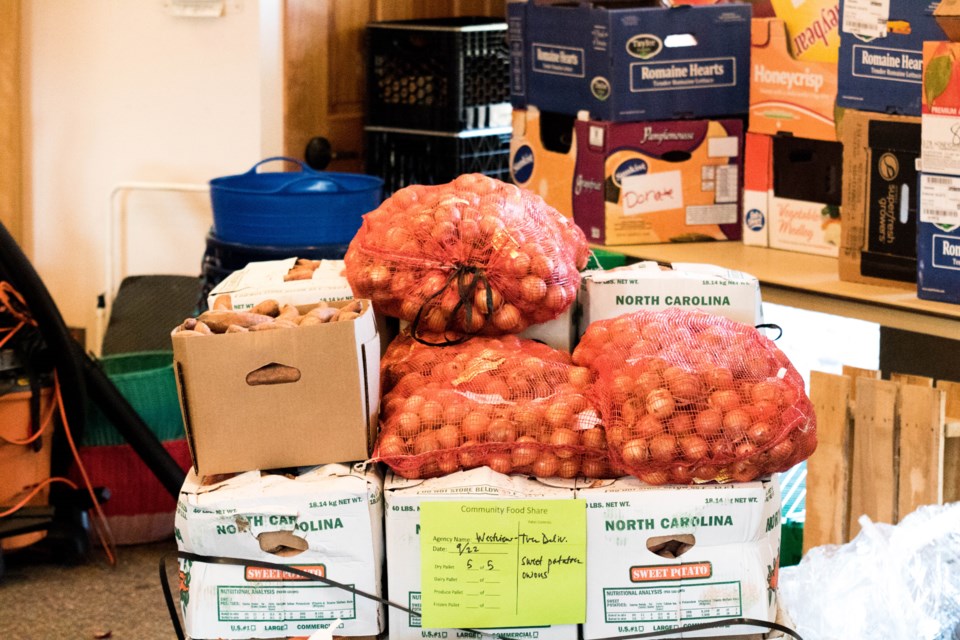 Food delivered by Community Food Share waits to be sorted and packaged for Round Pantry distribution on Tuesday at Westview Presbyterian Church. (Photo by Matt Maenpaa)
Food delivered by Community Food Share waits to be sorted and packaged for Round Pantry distribution on Tuesday at Westview Presbyterian Church. (Photo by Matt Maenpaa)